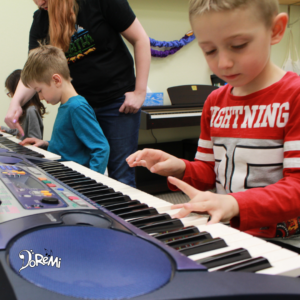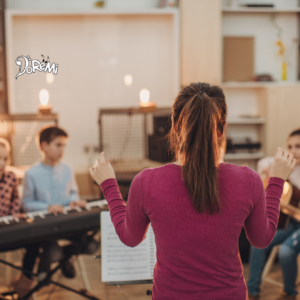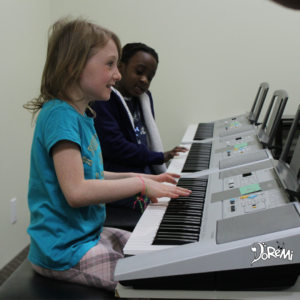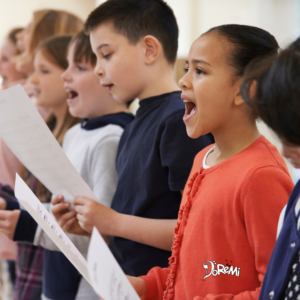
At DoReMi, we prefer to put our beginner students in group settings to start their musical journey. Why? Here’s our top 10 list of benefits and advantages to learning in a group:
1. Learning together with your peers is more fun!
We all know that learning to play an instrument is a lot of hard work. If a student enjoys the process from the very beginning, they are more likely to stick with it. Group learning allows us to instill the joy of making of music in our students from the very beginning, by incorporating games, movement, and a variety of other activities into the class. As well, the social aspect of coming to class with a group of like-minded people who share a common passion can often lead to life-long friendships.
2. It takes the pressure off
Private lessons can often result in a significant amount of pressure (either real or perceived) for the student to progress. In a group, progress is made together, small mistakes get lost, and there is the opportunity to learn by watching others. This not only reduces the amount of stress as compared to a private lesson, but also provides a bench mark for a student to measure their progress.
3. It’s a self-confidence boost
Along with a sense of social and emotional well-being, learning and playing in a group can be a great confidence booster. Children learn that it’s ok to make mistakes as they develop the ability to perform in front of others. Learning in a group can help budding musicians lower their inhibitions. Playing in front of others on a weekly basis helps students become less inhibited to play in front of family and friends (and even strangers). This lowered inhibition can carry over into other aspects of their lives as increased confidence and self-esteem.
4. Motivation
A beginner student in private lessons has no comparison, and can often lack motivation to practise. In class, on the other hand, the student needs to be prepared to play together with the group or in front of the class, and this can be a great motivator. A student who refused to practise one week, and wasn’t able to fully participate in class because of that decision, will rarely make that mistake again! A student can learn to perceive their classmates as reference points for self-evaluation and motivation.
5. Music Literacy
 Being in a group allows the teacher to not only cover a wide range of learning styles, but also to incorporate a myriad of games and activities to help reinforce their learning. A well-rounded music education is far more than just teaching a student how to play an instrument. It includes rhythm, dictation, composition and improvisation, history, singing, movement, and applied theory. In a group, these can be presented in an engaging and age-appropriate way. Classes are packed with a wide range of activities, leaving no room for boredom!
Being in a group allows the teacher to not only cover a wide range of learning styles, but also to incorporate a myriad of games and activities to help reinforce their learning. A well-rounded music education is far more than just teaching a student how to play an instrument. It includes rhythm, dictation, composition and improvisation, history, singing, movement, and applied theory. In a group, these can be presented in an engaging and age-appropriate way. Classes are packed with a wide range of activities, leaving no room for boredom!
6. Teamwork and Ensemble Skills

Playing in a group has the power to teach our students some of the most basic life skills such as cooperation, communication, consideration, and camaraderie. For an ensemble to be successful, the student must learn when to lead and when to provide support. A student must develop the ability to effectively listen not only to themselves, but also to their classmates around them. As with any team sport, students work toward the well-being of the entire group, learning that their personal success goes only as far as the success of the class. As a budding musician, a student will also learn how to follow the conductor, how to keep a steady beat, and how to ensure that their part fits into the ensemble.
7. Executive Function Skills
Being ready and on time for class, scheduling practice times during the week to be able to keep up with the progress of the class, making sure that homework is completed in time for class, all of these things help a student learn to be a more organized person.
8. Improved Focus
When you play in a group, you have to focus on many things simultaneously. You need to keep track of not only your own music and playing, but also watch the conductor for cues, all while keeping track of what’s going on around you. Playing in a group can help develop the ability to multi-task.
9. Healthy Competition
Our classes are designed to encourage students to improve on their own achievements every week. Through encouraging each other to get better and better, a little positive and healthy competition starts to arise, pushing students to do even better at home and in class. The combination of some mild competition together with the reassurance from the group works not only as a motivator, but also helps to create the absolute best environment for speedy progress.
10. Reduced Performance Anxiety
Stage fright often begins in childhood, and if not addressed properly may carry over into adulthood. Within the safety of the group, students learn that it’s ok to make mistakes, and they become accustomed to performing in front of an audience. That skill is transferable to many other situations, such as presentations at school or job interviews.
As you can see, there are many benefits to learning music in a group environment. Unfortunately, a lot of people view the traditional private lesson approach as the best way to ensure that their child progresses quickly. While for some students that may be true, over the past 19 years we have found that it is actually rarely the case. Music is best when shared! Playing in a group combines all of the ingredients needed for a full and complete training built on a solid foundation of theory and technique, with the social and emotional benefits of making music, plus a little added fun.
We have new classes starting soon. Check here for availability. We look forward to having you join us!



